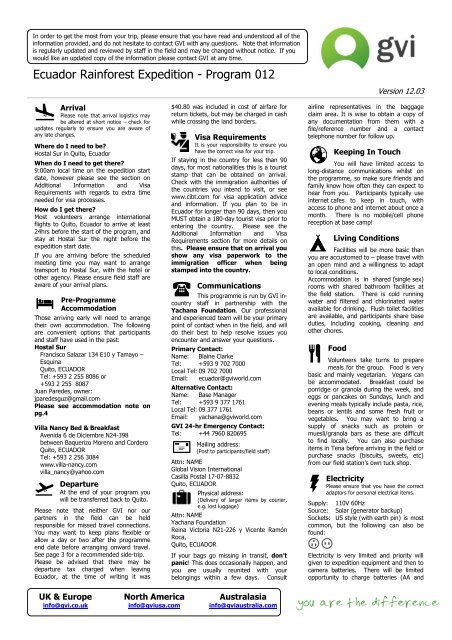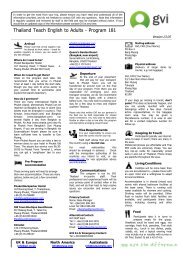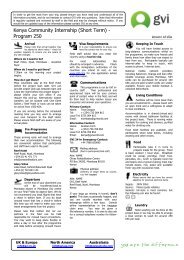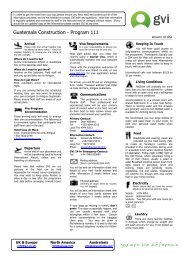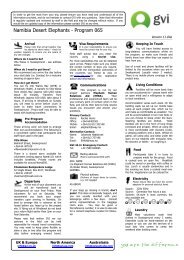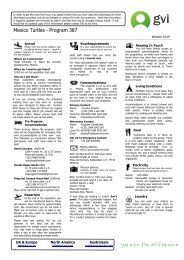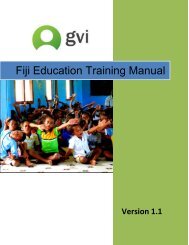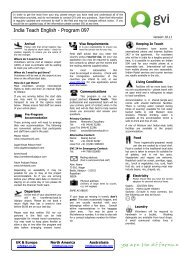Ecuador Rainforest Expedition - Program 012
Ecuador Rainforest Expedition - Program 012
Ecuador Rainforest Expedition - Program 012
You also want an ePaper? Increase the reach of your titles
YUMPU automatically turns print PDFs into web optimized ePapers that Google loves.
In order to get the most from your trip, please ensure that you have read and understood all of the<br />
information provided, and do not hesitate to contact GVI with any questions. Note that information<br />
is regularly updated and reviewed by staff in the field and may be changed without notice. If you<br />
would like an updated copy of the information please contact GVI at any time.<br />
<strong>Ecuador</strong> <strong>Rainforest</strong> <strong>Expedition</strong> - <strong>Program</strong> <strong>012</strong><br />
Version 12.03<br />
Arrival<br />
Please note that arrival logistics may<br />
be altered at short notice – check for<br />
updates regularly to ensure you are aware of<br />
any late changes.<br />
Where do I need to be<br />
Hostal Sur in Quito, <strong>Ecuador</strong><br />
When do I need to get there<br />
9:00am local time on the expedition start<br />
date, however please see the section on<br />
Additional Information and Visa<br />
Requirements with regards to extra time<br />
needed for visa processes.<br />
How do I get there<br />
Most volunteers arrange international<br />
flights to Quito, <strong>Ecuador</strong> to arrive at least<br />
24hrs before the start of the program, and<br />
stay at Hostal Sur the night before the<br />
expedition start date.<br />
If you are arriving before the scheduled<br />
meeting time you may want to arrange<br />
transport to Hostal Sur, with the hotel or<br />
other agency. Please ensure field staff are<br />
aware of your arrival plans.<br />
Pre-<strong>Program</strong>me<br />
Accommodation<br />
Those arriving early will need to arrange<br />
their own accommodation. The following<br />
are convenient options that participants<br />
and staff have used in the past:<br />
Hostal Sur<br />
Francisco Salazar 134 E10 y Tamayo –<br />
Esquina<br />
Quito, ECUADOR<br />
Tel: +593 2 255 8086 or<br />
+593 2 255 8087<br />
Juan Paredes, owner:<br />
jparedesguz@gmail.com<br />
Please see accommodation note on<br />
pg.4<br />
Villa Nancy Bed & Breakfast<br />
Avenida 6 de Diciembre N24-398<br />
between Baquerizo Moreno and Cordero<br />
Quito, ECUADOR<br />
Tel: +593 2 256 3084<br />
www.villa-nancy.com<br />
villa_nancy@yahoo.com<br />
Departure<br />
At the end of your program you<br />
will be transferred back to Quito.<br />
Please note that neither GVI nor our<br />
partners in the field can be held<br />
responsible for missed travel connections.<br />
You may want to keep plans flexible or<br />
allow a day or two after the programme<br />
end date before arranging onward travel.<br />
See page 3 for a recommended side-trip.<br />
Please be advised that there may be<br />
departure tax charged when leaving<br />
<strong>Ecuador</strong>, at the time of writing it was<br />
$40.80 was included in cost of airfare for<br />
return tickets, but may be charged in cash<br />
while crossing the land borders.<br />
Visa Requirements<br />
It is your responsibility to ensure you<br />
have the correct visa for your trip.<br />
If staying in the country for less than 90<br />
days, for most nationalities this is a tourist<br />
stamp that can be obtained on arrival.<br />
Check with the immigration authorities of<br />
the countries you intend to visit, or see<br />
www.cibt.com for visa application advice<br />
and information. If you plan to be in<br />
<strong>Ecuador</strong> for longer than 90 days, then you<br />
MUST obtain a 180-day tourist visa prior to<br />
entering the country. Please see the<br />
Additional Information and Visa<br />
Requirements section for more details on<br />
this. Please ensure that on arrival you<br />
show any visa paperwork to the<br />
immigration officer when being<br />
stamped into the country.<br />
Communications<br />
This programme is run by GVI incountry<br />
staff in partnership with the<br />
Yachana Foundation. Our professional<br />
and experienced team will be your primary<br />
point of contact when in the field, and will<br />
do their best to help resolve issues you<br />
encounter and answer your questions.<br />
Primary Contact:<br />
Name: Blaine Clarke<br />
Tel: +593 9 702 7000<br />
Local Tel: 09 702 7000<br />
Email: ecuador@gviworld.com<br />
Alternative Contact:<br />
Name: Base Manager<br />
Tel: +593 9 377 1761<br />
Local Tel: 09 377 1761<br />
Email: yachana@gviworld.com<br />
GVI 24-hr Emergency Contact:<br />
Tel: +44 7960 820695<br />
Mailing address:<br />
(Post to participants/field staff)<br />
Attn: NAME<br />
Global Vision International<br />
Casilla Postal 17-07-8832<br />
Quito, ECUADOR<br />
Physical address:<br />
(Delivery of larger items by courier,<br />
e.g. lost luggage)<br />
Attn: NAME<br />
Yachana Foundation<br />
Reina Victoria N21-226 y Vicente Ramón<br />
Roca,<br />
Quito, ECUADOR<br />
If your bags go missing in transit, don’t<br />
panic! This does occasionally happen, and<br />
you are usually reunited with your<br />
belongings within a few days. Consult<br />
airline representatives in the baggage<br />
claim area. It is wise to obtain a copy of<br />
any documentation from them with a<br />
file/reference number and a contact<br />
telephone number for follow up.<br />
Keeping In Touch<br />
You will have limited access to<br />
long-distance communications whilst on<br />
the programme, so make sure friends and<br />
family know how often they can expect to<br />
hear from you. Participants typically use<br />
internet cafes to keep in touch, with<br />
access to phone and internet about once a<br />
month. There is no mobile/cell phone<br />
reception at base camp!<br />
Living Conditions<br />
Facilities will be more basic than<br />
you are accustomed to – please travel with<br />
an open mind and a willingness to adapt<br />
to local conditions.<br />
Accommodation is in shared (single sex)<br />
rooms with shared bathroom facilities at<br />
the field station. There is cold running<br />
water and filtered and chlorinated water<br />
available for drinking. Flush toilet facilities<br />
are available, and participants share base<br />
duties, including cooking, cleaning and<br />
other chores.<br />
Food<br />
Volunteers take turns to prepare<br />
meals for the group. Food is very<br />
basic and mainly vegetarian. Vegans can<br />
be accommodated. Breakfast could be<br />
porridge or granola during the week, and<br />
eggs or pancakes on Sundays, lunch and<br />
evening meals typically include pasta, rice,<br />
beans or lentils and some fresh fruit or<br />
vegetables. You may want to bring a<br />
supply of snacks such as protein or<br />
muesli/granola bars as these are difficult<br />
to find locally. You can also purchase<br />
items in Tena before arriving in the field or<br />
purchase snacks (biscuits, sweets, etc)<br />
from our field station’s own tuck shop.<br />
Electricity<br />
Please ensure that you have the correct<br />
adaptors for personal electrical items.<br />
Supply: 110V 60Hz<br />
Source: Solar (generator backup)<br />
Sockets: US style (with earth pin) is most<br />
common, but the following can also be<br />
found:<br />
Electricity is very limited and priority will<br />
given to expedition equipment and then to<br />
camera batteries. There will be limited<br />
opportunity to charge batteries (AA and<br />
UK & Europe<br />
info@gvi.co.uk<br />
North America<br />
info@gviusa.com<br />
Australasia<br />
info@gviaustralia.com
In order to get the most from your trip, please ensure that you have read and understood all of the<br />
information provided, and do not hesitate to contact GVI with any questions. Note that information<br />
is regularly updated and reviewed by staff in the field and may be changed without notice. If you<br />
would like an updated copy of the information please contact GVI at any time.<br />
<strong>Ecuador</strong> <strong>Rainforest</strong> <strong>Expedition</strong> - <strong>Program</strong> <strong>012</strong><br />
Version 12.03<br />
AAA) and iPod/Mp3 players, so do bring<br />
rechargeable batteries along with a<br />
charger, in addition to regular batteries for<br />
back-up. Used batteries must be<br />
taken home for safe disposal. You are<br />
welcome to bring your own solar chargers<br />
if you like, for sunny days.<br />
Laundry<br />
Hand washing facilities and a<br />
covered drying area are available at the<br />
expedition base (Laundry soap is<br />
provided). Due to humid conditions,<br />
clothes may take several days to dry so<br />
bring extra items and do not bring<br />
valuable/delicate items.<br />
Getting Around<br />
You will be based<br />
a 15-minute canoe ride from the<br />
tiny community of Mondaña and the<br />
Yachana Lodge, and working in the<br />
Yachana Reserve and the neighbouring<br />
communities of Puerto Rico, Fuerzas<br />
Unidas and Agua Santa. Travelling around<br />
the local area is organised by field staff<br />
and is usually by motorised canoe or local<br />
bus.<br />
Exploring Further<br />
If you are spending 8 weeks or<br />
more on expedition, you may have the<br />
opportunity to have a 1 or more weekends<br />
off. During weekends off, volunteers may<br />
leave base and travel to nearby areas of<br />
<strong>Ecuador</strong>, at their own expense. There will<br />
be a set day and time that volunteers are<br />
required to be back on base. Tena, a small<br />
jungle city, is located 5 hrs away by bus<br />
and is a major centre for white water<br />
rafting and other visitor activities. Baños,<br />
another popular town for visitors, is a<br />
further 4 hr journey by bus and offers<br />
rafting, hiking, canyoning, horseback<br />
riding and the chance to glimpse lava from<br />
the Tungurahua volcano. You should<br />
check government travel advisories for<br />
information about travel safety. See p.3 for<br />
more details on an amazing adventure on<br />
the Napo River opportunity.<br />
Security<br />
For information about security issues in<br />
the country you are travelling to please<br />
see the following resources:<br />
UK Foreign & Commonwealth Office:<br />
www.fco.gov.uk<br />
US Government State Department:<br />
www.state.gov/travel<br />
Information for Canadians Abroad:<br />
www.voyage.gc.ca<br />
Australian Government Travel Advice:<br />
www.smartraveller.gov.au<br />
New Zealand Government Travel Advice:<br />
www.safetravel.govt.nz<br />
Whenever travelling you should be aware<br />
of the risk of opportunist crime and take<br />
common sense precautions to minimise<br />
the chance of becoming a victim. The vast<br />
majority of visits to <strong>Ecuador</strong> are troublefree,<br />
but if you have any specific questions<br />
about your safety and security on the<br />
program please contact GVI.<br />
Finance<br />
Local currency: US Dollar (USD)<br />
Participants typically spend<br />
approximately USD$5 to $10 per week for<br />
soft drinks and snacks at the optional<br />
Sunday football games, or the occasional<br />
visit to the local market. For weekends off,<br />
hostels may cost $8-15, meals can range<br />
from $5 to more than $15, depending on<br />
your preference, touristic activities<br />
(rafting, etc) could be from $50 upwards.<br />
You should bring an additional USD$150<br />
cash to cover the cost of any medical visits<br />
(see Additional Information). We<br />
recommend that you travel with cash as<br />
your main source of funds, although<br />
having a credit/debit card as a backup is<br />
wise, particularly for emergencies as most<br />
hospitals require payment at the time of<br />
service (you are responsible for getting<br />
reimbursed by your insurance later).<br />
ATMs are few and far between! Travellers'<br />
cheques are not widely accepted and are<br />
difficult to change.<br />
Shopping<br />
There may be optional visits to<br />
the nearby Yachana High School and<br />
Yachana Lodge, where some items can be<br />
purchased. Local crafts, particularly<br />
macramé jewellery made with seeds from<br />
the rainforest are available. Basic snacks<br />
and toiletries can be bought in the local<br />
community shop of Puerto Rico, where<br />
volunteers teach on a regular basis.<br />
Background Check<br />
As a service to our partners in<br />
the field and to protect the<br />
communities we work with, we require<br />
background checks for all participants who<br />
will be working unaccompanied with<br />
children or vulnerable adults at any point<br />
during their placement.<br />
United Kingdom<br />
Criminal Records Bureau Check (CRB)<br />
Australia<br />
Working With Children Check (WWC)<br />
Rest of World<br />
Police Background Check (consult local)<br />
This program does not require a<br />
background check. Further information<br />
on how to arrange a background check<br />
will be sent to you separately where<br />
relevant.<br />
Health & Safety<br />
A change of environment, climate,<br />
food and lifestyle often results in<br />
minor, and occasionally more serious, illness.<br />
Please inform staff if you feel unwell at any time.<br />
The nearest emergency medical facilities<br />
are located in Puerto Rico, a few<br />
kilometres away. This is a very basic<br />
medical clinic and additional facilities are<br />
located a further four or five hour drive<br />
from base in the towns of Coca or Tena.<br />
All staff are trained in Emergency First<br />
Response, and Emergency Action Plans<br />
are posted in camp.<br />
Please note that GVI cannot provide<br />
specific medical advice. Please consult<br />
your primary care provider (doctor, GP,<br />
etc.) or visit a travel clinic for further<br />
information. Please note that you are<br />
required to carry an International<br />
Vaccination Certificate in <strong>Ecuador</strong>.<br />
You must be in a good state of health and<br />
physical fitness prior to joining the<br />
expedition. Participants walk between<br />
three and five hours per day on<br />
challenging terrain that is very hilly,<br />
uneven and muddy. The climate is often<br />
hot, and humid, with heavy rain - we<br />
strongly recommend that you build up<br />
your stamina before joining the program<br />
to ensure you get the most from your<br />
experience. We often travel by motorised<br />
canoe so as a safety precaution it is also<br />
important that participants are confident<br />
and capable swimmers.<br />
For further Health & Safety information<br />
please see the Additional Information<br />
section.<br />
Pre Departure Training<br />
Staff in the field will provide training on<br />
the skills required, but you may benefit<br />
from learning more about local history,<br />
culture and customs before you travel.<br />
Please visit the GVI <strong>Ecuador</strong> resource site,<br />
http://www.gvi.co.uk/resources/ecuadortraining,<br />
where you will find details on the<br />
research and work you will carry out,<br />
species list and audio files for identification<br />
tests. These resources, and the training<br />
manual, will be invaluable for your<br />
expedition preparation and enjoyment.<br />
See p.4 for additional pre-departure<br />
reading<br />
suggestions.<br />
UK & Europe<br />
info@gvi.co.uk<br />
North America<br />
info@gviusa.com<br />
Australasia<br />
info@gviaustralia.com
In order to get the most from your trip, please ensure that you have read and understood all of the<br />
information provided, and do not hesitate to contact GVI with any questions. Note that information<br />
is regularly updated and reviewed by staff in the field and may be changed without notice. If you<br />
would like an updated copy of the information please contact GVI at any time.<br />
<strong>Ecuador</strong> <strong>Rainforest</strong> <strong>Expedition</strong> - <strong>Program</strong> <strong>012</strong><br />
Version 12.03<br />
Additional Information<br />
Visa Requirements Immigration regulations in <strong>Ecuador</strong> have changed several times in recent years. If you plan to be in the<br />
country for longer than 90 days, then you will need to obtain 180-day tourist visa prior to entering the country. At the time of<br />
writing, this needs to be registered with the <strong>Ecuador</strong>ian immigration authorities in Quito on arrival in <strong>Ecuador</strong>, and then a censo (ID) card must<br />
be obtained. These are two separate processes carried out at two different locations and you will need to allow a minimum of two days in Quito<br />
prior to the expedition date in order to fulfil these requirements. Please be aware that any flight delays or issues with transport may affect your<br />
scheduled arrival time and with this in mind it is advisable to arrive in <strong>Ecuador</strong> no later than the Monday night (prior to the Saturday start date).<br />
It is vital that on arrival at the airport or border, when being stamped into the country for the first time, that any visa documentation you<br />
already have from home is shown to the immigration officer. DO NOT wait until arrival in <strong>Ecuador</strong> to get your visa; visas MUST be obtained in<br />
your home country before arrival. Be sure to check that the date on your visa is set based on your arrival to <strong>Ecuador</strong> (not the date you began<br />
the visa application process at the Embassy) so that your visa allows enough days in country to complete the expedition/internship. You are<br />
responsible for meeting all requirements and providing all documents necessary to obtain your visa for entrance into <strong>Ecuador</strong>.<br />
Camp Life<br />
Site Description Our base camp is located on the Yachana Reserve, a private land reserve owned by our local partner the Yachana<br />
Foundation. Yachana is a Quechua (or Kichwa) word meaning “place of learning”. The reserve is located on the Napo River and lies mid-way<br />
between the small jungle cities of Tena and Coca in eastern <strong>Ecuador</strong>’s Napo province. The site is reached by bus, or a combination of bus and<br />
motorized canoe. We make the journey over two days, stopping overnight in Tena to allow for acclimatisation, last-minute provisioning and a<br />
final cold beer! Local residents are a mix of Quechua Indians, the main indigenous group in the area, and “colonos” who have migrated and<br />
settled from other parts of the country.<br />
Facilities The base camp is located in an area of secondary forest a few minutes’ walk from the rainforest where we conduct our research. The<br />
infrastructure is basic but comfortable and includes a large kitchen/dining area and dormitories which accommodate two or six people in bunk<br />
beds. Water is pumped from an adjacent stream into holding tanks that supply running water to the kitchen, toilets, showers and laundry area.<br />
Cooking is done on a large, propane stove. There is no refrigeration.<br />
If you have a digital camera, please bring your computer download cable as we compile CDs of photos and provide a copy to all expedition<br />
participants at the end of each phase.<br />
Climate Temperatures range from 15º to 35º C but usually fall between 24º and 28º C during the day. Rainfall is high with an average of 2500<br />
mm of rain per year which can double in years affected by the weather phenomenon El Niño. There are “wetter” and “drier” seasons however<br />
these terms are relative in the rainforest and you can expect a mix of heavy rain and bright sunshine throughout the course of your expedition.<br />
Health & Safety – Medical Emergencies<br />
You are responsible for covering the costs of all medical visits including transportation for you and an accompanying staff member. Most<br />
insurance companies will reimburse you for these expenses, please check with your insurance provider for details and claims procedures.<br />
Depending on the gravity or complexity of the medical issue, you may be required to travel to advanced medical facilities in Quito. We<br />
recommend that you set aside or have access to (via international debit card), a minimum of $150 in emergency cash to cover any urgent<br />
expenses.<br />
Some common medical issues are:<br />
High altitude: Quito sits at an altitude of 2800m (9000ft). Altitude affects everyone differently so please discuss this with your physician prior<br />
to travel. During your first few days in Quito do not overexert yourself and stay well hydrated by drinking plenty of water and avoiding caffeine<br />
and alcohol.<br />
Malaria, Dengue Fever, Yellow Fever: These mosquito-borne diseases are all present in the region. Consult your doctor or travel clinic for<br />
advice on risks, prophylactics and prevention. If you are travelling in Latin America after the expedition, be aware that many countries require<br />
proof of the Yellow Fever Vaccination upon entry, especially when coming from countries where Yellow Fever is present.<br />
Rabies: Rabies is present in the area and commonly transported by vampire bats. The rabies vaccination increases the window of time to<br />
treatment, however with or without the vaccination you will need to receive a series of post-exposure injections. While we strongly encourage<br />
participants to seek the full series of three rabies vaccinations prior to departure, we are aware that in some cases they are not available, or are<br />
extremely costly.<br />
Leishmaniasis: Leishmaniasis is a disease transmitted by the bite of a certain species of sand fly and is present in the region. Consult your<br />
doctor or travel clinic for advice on risks and prevention. There are no vaccinations or medications that can be taken to prevent this disease, so<br />
measures must be taken to avoid getting bitten; treatment of the disease is long and may be costly.<br />
Side Trips<br />
Optional Post-<strong>Expedition</strong> Side Trip: Adventure on the Napo River<br />
GVI Amazon has teamed up with our long-time friend, guide and local conservationist Hector Vargas to offer a unique trip to GVI volunteers.<br />
The trip is available for a minimum of 3 volunteers, starting the Monday after the Saturday end date of the expedition. The trip is a 4-day<br />
Amazon adventure along the Napo River, including visits to Hector’s own island, the Sumak Allpa monkey rehabilitation project, and cultural<br />
activities there; Yaku Kawsay, a Kichwa community-run river interpretation center; claylicks and hiking at Yasuni National Park; and hiking and<br />
UK & Europe<br />
info@gvi.co.uk<br />
North America<br />
info@gviusa.com<br />
Australasia<br />
info@gviaustralia.com
<strong>Ecuador</strong> <strong>Rainforest</strong> <strong>Expedition</strong> - <strong>Program</strong> <strong>012</strong><br />
Version 12.03<br />
wildlife-spotting at world-renowned birdwatching area of Limoncocha Biological Reserve. If interested, please make your flight plans<br />
accordingly; remember that the minimum number must be reached to for the trip to run. The trip normally runs Monday – Thursday, allow at<br />
least 1 day to get back to Quito afterwards for your flight out. All costs related to this side trip, including the time and travel between the end of<br />
the expedition and the start of the side trip, are at your own expense. This is a fantastic opportunity to learn even more about Amazon flora<br />
and fauna, as well as a unique chance to learn first-hand about indigenous culture in the Amazon. The trip is booked on the ground at base<br />
camp; however, you may let your GVI representative know ahead of time if you are interested, in case other volunteers are as well. Trip cost:<br />
$450.<br />
Other popular areas in <strong>Ecuador</strong> are Otavalo (home to one of the largest indigenous markets in South America); Baños (popular for adventure<br />
activities, with waterfalls and warm springs); Mindo (cloud forest region popular for birding and adventure activities) and the many volcanoes<br />
around Quito, such as the 5979m Cotopaxi (requires a professional guide and a few days of acclimatization hikes to attempt the summit).<br />
Accommodation note<br />
If you would like to book into Hostal Sur, and to guarantee your bed, please do book ASAP directly with them at the email or phone above and<br />
ensure you mention GVI in your booking as they give us a special rate. They will accommodate GVI volunteers in shared male or female rooms<br />
with other GVI volunteers. Please be aware if you make a booking and do not turn up you will be charged a “no show” fee (as is normal<br />
hostal/hotel practice). PLEASE BE AWARE THAT IF YOU USE ANY OUTSIDE AGENCIES TO BOOK YOUR ACCOMMODATION E.G.<br />
HOSTALBOOKERS, OR OTHER SIMILAR WEBSITES, YOU WILL NOT BE GIVEN THE PREFERENTIAL RATE THAT GVI GET WHEN BOOKING<br />
DIRECTLY WITH THE HOSTAL.<br />
Additional training resources<br />
Training resources for the Amazon expedition, including detail on the research you’ll be carrying out, species lists and audio files for the<br />
identification tests you will take on base, as well as suggested reading and other resources may be found at<br />
http://www.gvi.co.uk/resources/ecuador-training. These resources will be invaluable to you to prepare you for the expedition, please ensure<br />
that you visit the site, read the Training Manual and study/review the resources before your expedition, so that you can get the most out of your<br />
Amazon experience! Suggested reading:<br />
Lonely Planet: <strong>Ecuador</strong> and the Galapagos Islands – Rob Rachowiecki & Danny Palmerlee<br />
A Rough Guide to <strong>Ecuador</strong> – Harry Ades & Melissa Graham<br />
<strong>Ecuador</strong> and its Galapagos Islands - The Ecotravellers’ Wildlife Guide – David L. Pearson, Les Beletsky & Wildlife Conservation Society<br />
A Neotropical Companion – Mark Plotkin<br />
Birds of <strong>Ecuador</strong> – Robert S. Ridgely & Paul J. Greenfield. (Best guide for the keen ornithologist)<br />
Amazon, 2nd: The Brandt Travel Guide – Roger Harris & Peter Hutchinson<br />
UK & Europe<br />
info@gvi.co.uk<br />
North America<br />
info@gviusa.com<br />
Australasia<br />
info@gviaustralia.com
Please note that this kit list is intended to help you pack for your trip but should not be taken as a<br />
comprehensive or compulsory list of items to take. Some people are comfortable travelling lighter<br />
than others, and there may be some items which you feel you can survive without. If travelling<br />
alone you should ensure you can carry all your belongings for a short distance without assistance.<br />
<strong>Ecuador</strong> <strong>Rainforest</strong> <strong>Expedition</strong> - <strong>Program</strong> <strong>012</strong><br />
Version 12.03<br />
Essential Equipment<br />
These are items which staff in the field have deemed as required, or which previous volunteers all agree are must-haves. Check the<br />
boxes as you pack!<br />
1 Large Rucksack (Backpack): (65+ litres / 4,000+ cubic inches) for carrying the bulk of your gear to base and for use throughout the<br />
expedition.<br />
1 Daypack (Backpack): (25+ litres / 1,500+ cubic inches) will be used nearly every day. A backpack compatible with a hydration bladder<br />
(Platypus/Camelbak or equivalent) is a very good idea, as they have a hose for constant re-hydration whilst you walk. When we overnight at<br />
the satellite camps you will need to carry all your own water, so should have capacity for at least 4 litres (1 gallon), so you may need extra<br />
bottles on top of your hydration bladder capacity to carry the required amount.<br />
Water bottles to carry 4 L water. If you have a hydration pack (see above) then 1 extra 1-2 L bottle should bring you to 4L. If not, you’ll<br />
need 2-4 good sized bottles to reach the 4L total. You may bring and reuse plastic water bottles, but ensure you have large ones, and that they<br />
will hold up to daily use and refilling. Carrying the required minimum amount of water is MANDATORY for all surveys.<br />
Waterproof liners for important and non-waterproof items. Canoe/dry sacks are excellent, but trash bags also suffice!<br />
1 pair of Wellington/rubber boots which are mandatory for all survey work in the forest. These are easily purchased in <strong>Ecuador</strong> for<br />
approximately US$7 and you’ll be given an opportunity to do so en route to the expedition. We do have a small number of leftover boots<br />
available and camp and will advise you of sizes available. If you have particularly large feet, we recommend that you bring your own.<br />
1 pair of trainers / sneakers / hiking shoes for travel in towns and Sunday football (soccer) games. Bear in mind shoes will often get<br />
wet and take a long time to dry in a humid environment. Therefore, do not bring brand new shoes or ones that will take a long time to dry. A<br />
comfortable pair of trainers / sneakers are best and work very well with thin, quick-drying socks. These will not be worn in the forest,<br />
Wellies/rubber boots are worn at all times in the forest for survey work.<br />
1 pair of sandals (flip-flops / thongs) you will need these on camp to dry your feet out (leather is not recommended as mould is a<br />
problem in high humidity)<br />
1-2 pairs of shorts board shorts or baggies are great, quick-drying items.<br />
3 pairs of working trousers which you will be required to wear in the forest every day. These should be quick-dry, or high cotton-low<br />
polyester blend, or lightweight cotton and loose fitting on the legs (i.e. not leggings). A pair of comfortable, track/sweat/yoga-type pants is also<br />
recommended for around camp. Pants and rubber boots are required at all times in the forest for survey work; you will not be allowed to work<br />
in shorts.<br />
1-2 long-sleeve shirts such as collared work shirts or t-shirts with a high cotton content, for protection against mosquitoes especially at<br />
night.<br />
6 t-shirts these do not dry quickly so bring a few extra if you have room.<br />
Casual clothing - lightweight T-shirts/tops and shorts for towns and teaching - something slightly smarter than your work clothes for the<br />
classroom. You are expected to be clean and presentable at all times when teaching and/or representing GVI in the community.<br />
Light fleece or sweatshirt (hoody) as Quito gets quite chilly and night and there may be cooler evenings at camp.<br />
Waterproof jacket / Poncho - it is the rainforest, it does rain! We often travel in uncovered canoes so these are invaluable. Cheap<br />
ones may be purchased in <strong>Ecuador</strong>.<br />
Swimming trunks / costume / bikini<br />
Underwear cotton underwear is best (less hot), sports bras. Dark colours do not show dirt easily, as the water is cold for washing.<br />
Hiking socks 5 pairs of light hiking or LONG cotton sports socks to wear inside your boots.<br />
2 Towels an old and worn towel will dry more quickly, or you can buy a quick-drying travel towel. A sarong is definitely a useful extra.<br />
BOX-shaped mosquito net preferably treated with insect repellent, e.g. permethrin; single-size is sufficient.<br />
Lightweight sleeping bag for use on sat camp and cooler nights in camp.<br />
Fitted or flat bed sheet for single bed, to cover you mattress. You may also want to bring a single top sheet.<br />
1 Pillow Case Some volunteers have enjoyed having their own travel pillow, our pillows are subject to the humid, damp conditions of the<br />
rainforest.<br />
Binoculars with a power of at least [7 or 8] x [42 or 50] and preferably waterproof or nitrogen sealed. These are used fairly often for<br />
bird viewing, and it is worth having a decent pair; however go with what is affordable as it is not essential survey gear. Waterproofing is<br />
preferable as the humidity in the rainforest may cause fogging. Do some research and comparison shopping for the best deals.<br />
Sunglasses make sure they offer 100% UV protection. Cheap glasses can cause more damage than good.<br />
Hat, wide-brimmed for uncovered walks or canoe travel.<br />
Insect repellent without DEET if possible - it damages the rainforest environment, and can also corrode certain plastics and fabrics. If<br />
using DEET we advice a maximum of 30% content There are several brands of DEET-free repellent available, and natural products such as oil<br />
of lemon eucalyptus and citronella can also be used.<br />
Water bottles / Camelbak / Platypus water bladder for short trips and for satellite camps, with a hose for constant re-hydration<br />
whilst you walk. When we overnight at the satellite camps you will need to carry all your own water, so should have capacity for at least 4 litres<br />
(1 gallon).<br />
Compass and whistle to be carried on all walks in the forest. We advise purchasing a reasonable quality compass that allows you to<br />
take bearings to at least 10 degrees.<br />
Paracord x 10 metres to hang up your mosquito net and personal items in camp or during field trips. Paracord is a strong, lightweight<br />
cord/rope.<br />
Toiletries shampoo, talc (or other absorbent powder), etc. – preferably biodegradable to minimise our impact on the environment.<br />
Hand sanitizer<br />
Any prescribed medication you need during your trip. Make sure it bears your name and description of reason and dosage.<br />
Basic first aid kit including rehydration salts, plasters/band-aids, antihistamine tablets and cream for bites, fungicidal foot powder, antidiarrhoea<br />
tablets, paracetamol/ibuprofen/aspirin, antiseptic wipes.<br />
UK & Europe<br />
info@gvi.co.uk<br />
North America<br />
info@gviusa.com<br />
Australasia<br />
info@gviaustralia.com
Please note that this kit list is intended to help you pack for your trip but should not be taken as a<br />
comprehensive or compulsory list of items to take. Some people are comfortable travelling lighter<br />
than others, and there may be some items which you feel you can survive without. If travelling<br />
alone you should ensure you can carry all your belongings for a short distance without assistance.<br />
<strong>Ecuador</strong> <strong>Rainforest</strong> <strong>Expedition</strong> - <strong>Program</strong> <strong>012</strong><br />
Version 12.03<br />
Sun cream high factor, at least SPF15+.<br />
Batteries - re-chargeable are best but please be advised that priority use of charging equipment (i.e. generator, etc.) will be given to<br />
expedition and equipment and cameras, and not to portable music players. If you do bring non-rechargeable batteries we will ask you to take<br />
them back with you to dispose of them at home.<br />
Headtorch/headlamp for use in camp at night, as we have no electricity. It is worth investing in the best headtorch you can afford as it<br />
will be used daily and for night walks in the forest you will need a reliable, strong beam - the brighter the beam, the more creatures you could<br />
spot! In the past, volunteers have enjoyed both the Petzl Tikka XP as well as the Petzl MYO RXP, however there are many brands and options<br />
available, so look around to find a good lamp for a good price.<br />
Torch/Flashlight a strong powerful flashlight/torch for night time surveys. We require one working source of light plus extra batteries or<br />
extra backup torch for all night-time surveys.<br />
Pen knife / Leatherman<br />
Watch time-keeping is essential on all projects and we will leave without you if you're not there on time.<br />
Alarm clock for those early mornings!<br />
Money belt (bum bag / fanny pack) to carry money and passport discreetly.<br />
Stationery you will need a notebook and pen for use during the training period.<br />
Electrical adaptor to convert both socket style and voltage if necessary.<br />
2 copies of your passport<br />
Highly Recommended Equipment<br />
Waterproof covers for your backpack and daypack<br />
Sleeping bag liner – adds warmth (the jungle can get chilly at night) but more importantly keeps your sleeping bag clean, especially on<br />
satellite camps! You can purchase a liner or make one from an old sheet.<br />
Spare bulbs for your torch / flashlight (unless it is LED based light).<br />
Plastic and re-sealable bags to keep things dry in those humid conditions!<br />
Camera you'll get a lot of opportunities to take photos to bring the best camera you own!<br />
Drybag and silica gel will help protect any valuable, electronic equipment dry in the humid, wet conditions.<br />
Sweater/Jacket/Jumper Quito is quite chilly and often rainy, so a sweater/jumper/jacket is recommended.<br />
Optional Equipment<br />
Headscarf / sham rag / bandana / baseball cap some kind of headwear is useful when walking in the forest and used as a rag to dry<br />
off sweat!<br />
Paracord x 10 metres to hang up your mosquito net and personal items in camp or during field trips. Paracord is a strong, lightweight<br />
cord/rope.<br />
Clothing to wear when going out to a restaurant/bar in Tena (on way in & out of base) or on weekend off.<br />
Vitamin tablets We will always try to ensure that fresh fruit and vegetables form a part of the regular meals supplied, however, you may<br />
also wish to bring a supply of vitamin supplements with you. Other participants have suggested natural antiviral / antibacterial products, e.g. oil<br />
of oregano, garlic oil, emergency vitamin C.<br />
Travel games / Cards<br />
Books some novels have been left at camp by others.<br />
CD players / MP3 player / World Service Radio please bring headphones so you don’t blast away the local wildlife!<br />
Umbrella A small, sturdy, strong umbrella can be very useful for sun and rain. Allows for better ventilation than waterproof rain gear.<br />
Snacks / sweets very good idea as town trips are limited, usually once per week. Anything you think you might crave, but be aware that<br />
you will sweat and hence loose salts and use up sugar, so even people without a sweet tooth will crave sweets/snacks! Granola bars, chocolate,<br />
dried fruit or jerky serve as good snacks in between the 3 daily meals.<br />
Personal Solar Chargers bearing in mind the limited sources of power available in our environment, you might want to invest in your<br />
own source of power. There are many options available and some are a little pricey, however some previous participants have found these little<br />
gadgets invaluable.<br />
Special Advice for Women Volunteers<br />
If prone to yeast infections, bring your medication with you, as heat and humidity of the rainforest can exacerbate such problems.<br />
Mooncups/Divacups are an environmentally-friendly alternative to tampons. Bring a small Tupperware tub and baby bottle sterilizing<br />
tablets to clean.<br />
Padded bras can go moldy in the rainforest, thus sports bras and bikini tops are ideal. Bear in mind that bikinis are not always as<br />
durable or comfortable.<br />
Hints on Buying Kit/Equipment<br />
Old clothes are often best when working in the rainforest - clothing will get sweaty every day and may get discoloured due to insect repellent or<br />
mould (even clothes that you do not wear, but fail to keep dry when stored). Avoid this by storing clean, dry clothes in airtight bags/sacks.<br />
The humidity is always high and it will rain! Waterproof clothing is of limited value as you will get wet anyway, at least from sweating! Accept<br />
that you are going to the rainforest and therefore you will get wet. Having a dry set of clothes for time spent at camp is the best option.<br />
However, a waterproof poncho/jacket is useful for downpours. Be aware that leather items (belts, shoes) are especially prone to mould. Quickdrying<br />
clothes are always recommended since it can be difficult to dry clothes when it is raining. Denim jeans are terrible for this!<br />
Before setting off in search of your essential kit, compile a list of everything that you need. When buying your kit you may find that by<br />
mentioning to the store assistants (or ideally the manager) that you are joining a volunteer project enables you to negotiate a discount on your<br />
UK & Europe<br />
info@gvi.co.uk<br />
North America<br />
info@gviusa.com<br />
Australasia<br />
info@gviaustralia.com
<strong>Ecuador</strong> <strong>Rainforest</strong> <strong>Expedition</strong> - <strong>Program</strong> <strong>012</strong><br />
Version 12.03<br />
purchases. Often stores are authorised to offer a discount (typically 10-15%) at their discretion, so it is always worth mentioning that the kit is<br />
required in aid of a good cause.<br />
Shop around for kit. If you are never going to use items again then it is not worth going for the top brands! Cheap lightweight clothing is<br />
sometimes just as good if not better.<br />
UK & Europe<br />
info@gvi.co.uk<br />
North America<br />
info@gviusa.com<br />
Australasia<br />
info@gviaustralia.com


